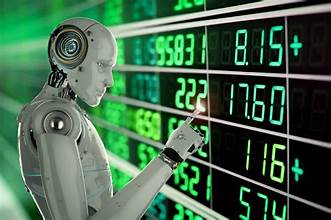Artificial Intelligence(AI) Technology

It continues to be one of the most innovative and ground-breaking developments of the twenty-first century, revolutionising the way we interact with machines, process data, and solve challenging problems. At its core, simulated intelligence alludes to the recreation of human knowledge in computers, enabling them to carry out tasks that typically call for mental abilities akin to those of humans, such as picking up, thinking, critical thinking, and discernment. Potential uses for simulated intelligence span a wide range of industries, from finance and healthcare to transportation and deception.
Improved proficiency and efficiency are two of the most obvious advantages of artificial intelligence. Simulated intelligence frameworks can handle boring and time-consuming tasks with notable accuracy and speed through robotization and clever calculations. This not only enables HR to focus on more innovative and important tasks, but it also leads to significant expense reserves for businesses.
Benefits of AI technology
- The benefit of simulated intelligence innovation is its potential to enhance client interactions. With their availability of round-the-clock assistance and quick responses to requests, chatbots and other remote assistants powered by artificial intelligence have become commonplace in customer service. These frameworks can comprehend everyday language, provide personalized recommendations, and address problems, resulting in a consistent and productive partnership for clients.
- Computer-based intelligence also plays a crucial role in development. It has facilitated the development of avant-garde innovations like self-driving cars, cunning machines, and, surprisingly, creative computer-based intelligence produced content. AI calculations can uncover hidden examples and connections within data, leading to revelations that probably wouldn’t have been possible using conventional methods.
- In the field of training, artificial intelligence-driven personalised learning stages pay close attention to each student’s needs, pacing, and learning preferences. Better dedication and understanding are encouraged by this tailored approach, which leads to results that are more focused on imparting knowledge. Artificial intelligence has also found use in ecological observation, helping to predict catastrophic events, tracking environmental changes, and streamlining asset management executives.
- Innovation in artificial intelligence offers numerous benefits in a variety of fields. Computer-based intelligence has a significant impact on everything from increased productivity and information-driven decision-production to better client interactions and creative leaps forward. Associations and social orders can investigate complex issues and pave new paths for growth and advancement by using the power of simulated intelligence.
Future of AI Technology
The future’s use of computer-based intelligence is poised to bring about remarkable changes in a number of spheres and aspects of our lives. Simulated intelligence is driving new skylines that were previously only seen in science fiction due to the remarkable advancement in computational power and advances in AI calculations.
- Its integration into medical services may be one of the most significant influences on where artificial intelligence is headed. The ability of artificial intelligence frameworks to rapidly and precisely analyse vast amounts of clinical data holds the potential to upend diagnosis, treatment planning, and patient care. Clinical experts can detect early signs of diseases with unparalleled accuracy with the aid of demonstrative devices controlled by simulated intelligence, and individualised treatment plans can be developed in consideration of a patient’s hereditary characteristics and medical background. This trend toward more accurate medication may lead to stronger drugs and longer-lasting effects.
- Self-driving cars and robotic drones are on the verge of becoming commonplace in the transportation industry. These developments could not only significantly improve street security and reduce traffic, but they could also change the way we drive. In any case, the successful integration of these advancements depends on addressing ethical conundrums, such as determining how simulated intelligence should prioritise lives in emergency situations.
- Financial administrations are also prepared for change thanks to calculations using artificial intelligence that analyze market trends and predict business opportunities with amazing accuracy. This might open up access to financial advice and speculation processes, but it might also give rise to concerns about algorithmic bias and the potential for escalating financial imbalances.
- Concerns about job loss and the anticipated collapse of particular ventures are also brought up by the eventual fate of artificial intelligence. While computer-based intelligence may eliminate some mundane tasks, it may also create opportunities for retraining and skill enhancement in recently emerging fields related to the support, improvement, and oversight of computer-based intelligence.
- Considering the broader cultural ramifications is essential in the progression of simulated intelligence. To ensure that computer-based intelligence development is moral, secure, and considerate of individual protection, stricter guidelines and rules are expected. A future where artificial intelligence benefits all humankind requires collaborative efforts from lawmakers, tech companies, and academic institutions.
Impact of artificial intelligence in technology
Virtually every aspect of modern life has been permanently altered by the development of computer-based intelligence, fundamentally altering the way we communicate, work, and interact with one another. Its impact is clear in businesses, where automation and information-driven knowledge have streamlined workflows, increased productivity, and opened up new career opportunities.
Man-made intelligence assists clinical experts in the field of medicine in a variety of ways, including speeding up the discovery of new drugs, developing personalised treatment plans, and diagnosing illnesses. To make wise business decisions and manage bets, artificial intelligence calculations in finance pore over enormous datasets. The entertainment scene has been upended by content created by artificial intelligence on computers, from proposal frameworks guiding our media choices to realistic enhanced visualisations in films and video games. Though these developments have a remarkable impact, moral considerations regarding calculation biases, safety issues, and the mechanisation of the workplace highlight the need for careful decision-making and guidance of artificial intelligence technology. The significance of exploring human-made intelligence’s complexities with an equilibrium of development, moral awareness, and responsibility is highlighted by the fact that it has a significant impact on society and is still being developed.
Conclusion
All things considered, the future of artificial intelligence technology is highly important, but it also poses challenging problems. As we move forward, careful consideration of morals, rules, and the balance between robotization and human oversight will be crucial in containing computer-based intelligence’s potential while minimizing its risks. The journey ahead calls for specialized development as well as a big responsibility to mindfully improve artificial intelligence to benefit society.



